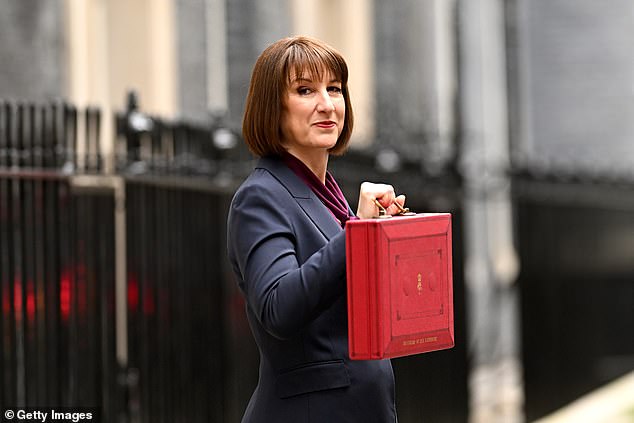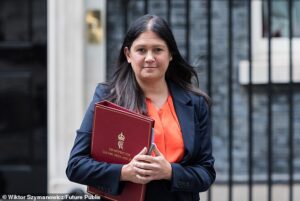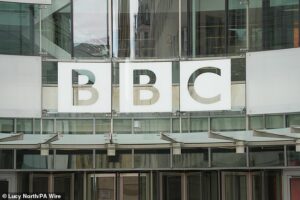By GREG HEFFER, POLITICAL CORRESPONDENT and HARRIET LINE, DEPUTY POLITICAL EDITOR
Published: | Updated:
Sir Keir Starmer today refused to rule out further tax hikes when the Chancellor delivers her Budget in the autumn.
The Prime Minister tried to push back at economists’ claims that Labour is facing a £50billion black hole in the public finances.
He insisted he didn’t recognise ‘some of the figures that are being put out’ amid suggestions that Rachel Reeves is on track to miss her fiscal rules.
But he failed to rule out significant tax hikes – such as to income tax, VAT or corporation tax – in this autumn’s Budget.
Sir Keir said Ms Reeves would focus on ‘living standards’ and ‘making sure that people feel better off’ in Labour’s next fiscal package.
The PM spoke following a leading think tank’s warning that Labour will soon need to raise taxes again.
The National Institute of Economic and Social Research (NIESR) said Ms Reeves would have to find the equivalent of adding 5p to income tax to keep afloat by the end of the decade and meet her fiscal rules.
It found that the ‘wafer thin’ headroom of £9.9billion Ms Reeves left herself last year has been wiped out, and there is now a budget deficit of £41.2billion.
To fill the hole and maintain the buffer, the Chancellor will have to find £51billion annually in higher taxes or lower spending by 2029/30.



Speaking to broadcasters on a visit to Milton Keynes on Wednesday, Sir Keir declined to explicitly say whether Labour was still committed to not raising VAT, income tax and corporation tax.
‘In the autumn, we’ll get the full forecast and obviously set out our budget,’ the PM said.
‘The focus will be living standards, so that we will build on what we’ve done in the first year of this Government.
‘We’ve stabilised the economy. That means interest rates have been cut now four times.
‘For anybody watching this on a mortgage that makes a huge difference on a monthly basis to how much they pay.
‘In the first year, we’ve raised wages as well, both in the private sector plus the minimum wage, which means people have got a bit more money coming into their pocket.
‘And so at this stage that will be set out in the Budget, but the focus will very much be on living standards and making sure people feel better off.’
Downing Street sources later sought to clarify that Labour remains committed to its manifesto pledges, which included a promise not to raise taxes on ‘working people’, including income tax and VAT.
Asked whether he disagreed with economists warning that tax rises in the Budget would be necessary to raise revenue, Sir Keir said ‘some of the figures that are being put out are not figures that I recognise’.
Despite announcing tax rises worth £40billion in last year’s Budget, Ms Reeves has repeatedly refused to rule out a fresh raid this autumn.
Labour’s lack of an economic plan on entering government was also criticised.
Tory shadow chancellor Sir Mel Stride said: ‘Experts are warning Labour’s economic mismanagement has blown a black hole in the nation’s finances which will have to be filled with more tax rises – despite Rachel Reeves saying she wouldn’t be back for more taxes.
‘Labour will always reach for the tax-rise lever because they don’t understand the economy.
‘Businesses are closing, unemployment is up, inflation has doubled and the economy is shrinking.
‘And Labour are refusing to rule out more damaging tax rises on investment.’
Professor Stephen Millard, deputy director of NIESR, said: ‘When Labour were elected we had known for a good year or two that Labour were going to be elected, so the really disappointing thing from my point of view was that when they came in, there didn’t seem to be a plan on the table.
‘A lot of the problems the Chancellor is facing could have been almost headed off… if they had come with a clear plan. If she is going to raise £50billion, that requires large increases in taxes. Fiddling at the edges is not going to do the job.’
Labour MPs and unions have urged Ms Reeves to impose a wealth tax to balance the books. Freezing income tax bands for longer could also be on the cards.
But neither measure would bring in revenue in the region of £50billion – and Ms Reeves is constrained by Labour’s manifesto promise not to raise National Insurance, income tax or VAT on ‘working people’.
Culture Secretary Lisa Nandy played down the prospect of Labour introducing a wealth tax, telling Sky News this morning: ‘The Chancellor has very much poured cold water on that idea, partly because many countries have tried this sort of approach, but mostly because we were elected as a Government in a time when taxes on working people were at their highest rate for generations.
‘We want to bring taxes down for people, we want to help support them, put money back into people’s pockets, and all the things that we’ve been doing as a Government in the last 12 months have been aimed at that.’
Speaking ahead of the publication of NIESR’s economic outlook on Wednesday, Professor Millard said: ‘We think the current budget deficit in 2029/30 will be around about £41.2billion – that’s 1.17 per cent of GDP.
‘It also means that if the Chancellor wishes to maintain a buffer of £9.9billion then she will have to find £51billion either in higher taxes or in lower spending or both annually by 2029/30.’
He suggested Ms Reeves should build a bigger buffer, arguing that £9.9billion is ‘wafer thin’ and that any ‘slight change’ in fiscal circumstances would wipe it away.
But building a bigger buffer would require ‘a moderate but sustained increase’ in taxes.
Professor Millard said he expected the Chancellor to extend a freeze on income tax thresholds beyond 2028, bringing in around £8.2billion.
He said filling the £50billion black hole would be a huge undertaking, adding: ‘We’re looking at something like a five percentage point increase in both the basic rate and the higher rate of income tax.’
Professor Millard said he was not advocating such a tax rise, but was ‘trying to illustrate these are the really hard decisions the Chancellor will need to make’.
He warned that the most vulnerable in society must be protected, and public investment should be ringfenced.
NIESR calculated that the Government’s failure to pass planned welfare reforms would mean additional spending of £13.7billion, and the continuation of the winter fuel allowance will add £1.5billion.
Furthermore, the think-tank said weaker growth in output and employment – compared with the Office for Budget Responsibility (OBR) forecast – accounted for a difference of £22.2billion in 2028/29.
It also said there was a £14.3billion difference between the OBR’s March forecast for total expenditure and NIESR’s forecast.
Together, the difference between the OBR’s March forecast and NIESR’s analysis is £51billion – including the £9.9billion surplus for 2028/29 the Chancellor had in March.
The Chancellor set herself two fiscal rules – the ‘stability rule’, which ensures day-to-day spending is matched by tax revenues so the Government only borrows to invest, and the ‘investment rule’, which requires the Government to reduce net financial debt as a share of the economy.
The think-tank said the shortfall in her ‘stability rule’ in 2029/30 means she faces an ‘impossible trilemma’ of trying to meet her fiscal rules, keep spending commitments and follow a manifesto pledge to not raise taxes.
Elsewhere in the report, NIESR boosted its economic outlook for the UK, with growth of 1.3 per cent now pencilled in for 2025, up from 1.2 per cent forecast in May.
But it cut its prediction for next year to 1.2 per cent, down from the 1.5 per cent previously expected.
The think-tank also expects CPI inflation to remain well above the Bank of England’s target at around 3.5 per cent this year, and 3 per cent in the second quarter of 2026, mainly because of persistently high wage inflation, and the inflationary effects measures announced in last year’s autumn Budget.
In better news for mortgage holders, NIESR expects the Bank to cut interest rates twice more this year, giving a rate of 3.5 per cent at the beginning of 2026.
The first of the 0.25 per cent cuts could come tomorrow, when the Bank of England publishes its latest monetary policy report.
A Treasury spokesman said: ‘The best way to strengthen public finances is by growing the economy – which is our focus. Thanks to our planning reforms, the OBR has said that the economy is expected to grow by the end of the decade.’








